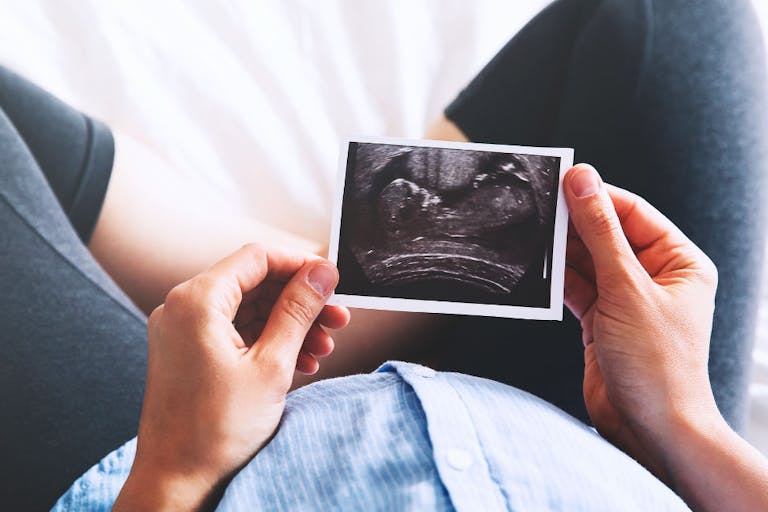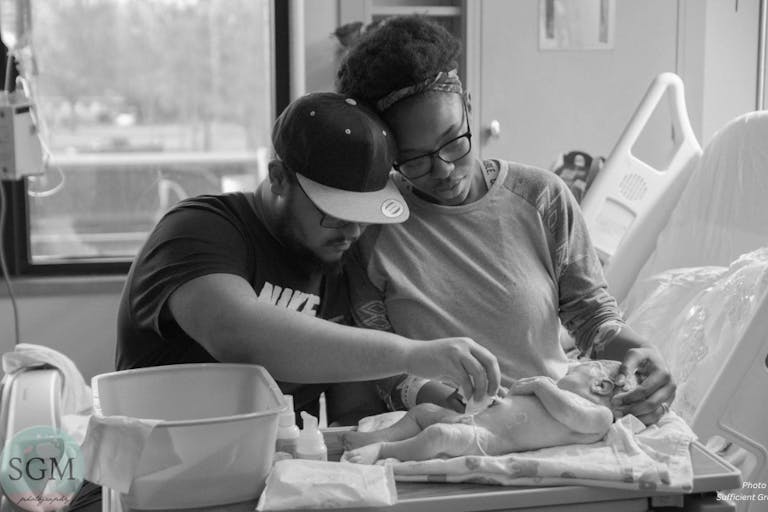
Pro-life organizations call on Congress to protect pregnancy resource centers
Bridget Sielicki
·
Human Interest·By Nancy Flanders
‘I’m bathing my baby:’ Perinatal hospice shows how every baby should be treated
Abortion advocates have managed to convince even some in the pro-life movement that induced abortion is necessary late in pregnancy when a preborn baby is diagnosed with a life-limiting health condition. The story of baby Aryah and her parents in perinatal hospice exposes this lie and its cruelty.
Aryah’s story is one of love, compassion, and peace. Sufficient Grace Ministries (SGM) is a perinatal hospice and bereavement support organization that provides assistance to parents facing a miscarriage, stillbirth, or infant loss. Volunteers serve more than 1,200 families a year, including Aryah’s family.
In a Facebook post with her parents’ permission, SGM shared a touching moment between Aryah and her mother. Though it doesn’t say what caused Aryah’s death, its beauty and honesty shows Aryah’s humanity, and provides an example of how every baby — even those who will not survive birth or shortly after birth — deserves to be treated: with dignity and respect, not as a defective product to be thrown away.
“This is baby Aryah and her sweet parents,” the post said. “SGM Comfort Team members, Kelly and Tiffany, had the privilege of helping her family celebrate her brief life. As we walk with grieving parents, we often hear reflections of regret… how much they wish they would’ve known that they could give their baby a bath, how much they wish they had taken time to soak in precious memories, how they wished they could dress their baby, and how much they wished they had beautiful photographs to capture the time.”
The Facebook post continued:
As an SGM Comfort Doula, I carry so many sacred moments in my heart. One of them was a simple, yet powerful sentence from Aryah’s mother, Shayla.
Aryah’s grandmother asked the young parents:
“Are you doing okay?”
Shayla answered with a grateful whisper, laced with the hint of pride from a momma’s heart, while soaking in the sacred weight of the moment:
“I’m bathing my baby.”
Article continues below
Dear Reader,
In 2026, Live Action is heading straight where the battle is fiercest: college campuses.
We have a bold initiative to establish 100 Live Action campus chapters within the next year, and your partnership will make it a success!
Your support today will help train and equip young leaders, bring Live Action’s educational content into academic environments, host on-campus events and debates, and empower students to challenge the pro-abortion status quo with truth and compassion.
Invest in pro-life grassroots outreach and cultural formation with your DOUBLED year-end gift!
The simple act of bathing a baby — taken for granted by so many — gave Aryah’s family the gift of a special moment with her, and a sweet memory to cherish. They also dressed her in a beautiful outfit and took precious photos.
She is their baby, not a mistake. She is a human being who deserves love and compassion.
Perinatal hospice allowed Aryah’s family to have all of that.
Consider, in contrast, the heartbreaking story of Kate Cox and her daughter Chloe. When Chloe was diagnosed with Trisomy 18 in the womb, Cox sued the state of Texas to allow her to abort Chloe after 20 weeks of pregnancy, using the common D&E abortion procedure — in which Chloe would be dismembered. Texas ruled against this horrific act, so Cox left the state to have the abortion. She called it the “compassionate” choice for Chloe, and is being hailed as a hero by abortion advocates; Cox even spoke along with other women at the Democratic National Convention, where she was celebrated for being pregnant again… with a healthy baby.
But Chloe, like Aryah, deserved to be held by her parents and dressed in a sweet outfit. She also deserved the chance to live, as many babies born with Trisomy 18 do survive, thanks to doctors who are willing to care for them despite their health challenges. But instead, Chloe was treated as disposable, as unworthy… so her arms and legs were torn from her body, her skull crushed in an act of violence that her own mother deemed to be more compassionate than birthing her and holding her.
Carrying to term after a diagnosis and having moments like the ones Aryah’s parents had with her is not only respectful of the baby, but good for the parents’ mental and emotional health.
Research shows it is beneficial to the mother to carry her child to term after a prenatal diagnosis. In a study of 267 parents who lost a child due to a diagnosis of life-limiting anencephaly, women who had an abortion reported significantly more despair and depression than women who carried to term. Additional research on infant loss found that while any prenatal or infant loss is traumatic, “[r]isk of complicated grief was found to be especially high after termination of a pregnancy due to fetal abnormality.”
In a study of 405 parents who carried to term following the prenatal diagnosis of a life-limiting condition, 97.5% of participants reported an absence of regret in carrying to term. Another study determined that “[c]ouples experienced selective termination as traumatic … [T]he women ultimately felt as if they were betraying themselves and their babies.” Additional research shared by the organization Be Not Afraid supports this; it says that parents who carry to term report being emotionally prepared for their child’s birth and possible death, and share that they felt “a sense of gratitude and peace surrounding the brief life of their child.”
Aryah’s story shows the value of honoring a child’s life through perinatal hospice, even though that life may be short. Aryah’s parents did not deny Aryah’s humanity, and instead, showed their baby the love, compassion, dignity, and respect — which every baby deserves.
Live Action News is pro-life news and commentary from a pro-life perspective.
Contact editor@liveaction.org for questions, corrections, or if you are seeking permission to reprint any Live Action News content.
Guest Articles: To submit a guest article to Live Action News, email editor@liveaction.org with an attached Word document of 800-1000 words. Please also attach any photos relevant to your submission if applicable. If your submission is accepted for publication, you will be notified within three weeks. Guest articles are not compensated (see our Open License Agreement). Thank you for your interest in Live Action News!

Bridget Sielicki
·
Human Interest
Bridget Sielicki
·
Human Interest
Sheena Rodriguez
·
Human Interest
Angeline Tan
·
Human Interest
Andrea Trudden
·
Human Interest
Lisa Bast
·
Human Interest
Nancy Flanders
·
Politics
Nancy Flanders
·
Human Interest
Nancy Flanders
·
Politics
Nancy Flanders
·
Human Interest
Nancy Flanders
·